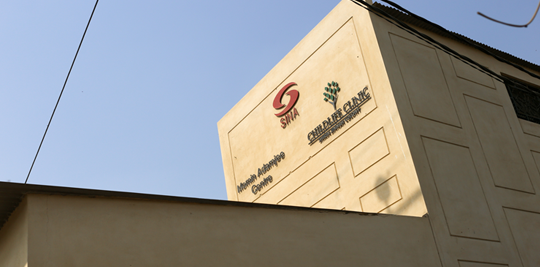
Momin Adamjee Clinic
The Momin Adamjee Center is in the heart of the Shireen Jinnah Colony, home to nearly 400,000 people. The locality is dotted with quacks charging a hefty fee for subpar treatment, and selling counterfeit medicines. The people here are plagued by gastrointestinal diseases and dehydration because potable water is unavailable. Although the Ziauddin Hospital is close by, the massive demand for health services here outstrips its capacity. This clinic began operations in April 2014, donated by our trustee Iqbal Adamjee and named after his father.
On a sunny winter morning, the clinic is thronging with patients: a little boy who burned himself by spilling his father’s hot dinner over himself; an infant girl who swallowed her siblings’ Ludo counter and is the very picture of misery as she waits for an ultrasound; and countless others.
30,000 children have been treated at the Momin Adamjee Centre completely free of cost. This clinic is also the centre of the pilot project of our Preventive Programme, which will reach out to 45,000 individuals to give door to door education on hygiene, sanitation, vaccinations, and other means to avoid illnesses.
<strong>Dr.Farida</strong>
In the doctor’s room sits Dr. Fareeda, a friendly, no-nonsense doctor who has been working with ChildLife since 2013. “Working here is very satisfying, because you’re making a practical difference in people’s lives,” she says.
Dr. Fareeda loves the patient focus of this organisation, reflected in all its protocols, trainings and methods. The medicines stocked in the pharmacy change according to season, so that patients never have to buy substandard ones from outside. And if there is ever a case which is beyond the scope of the doctor, the referral clinic guides the patient to the right doctor in Civil Hospital or Jinnah Hospital, so that she doesn’t have to run from pillar to post. Although she has previously worked in the Navy, her experience at ChildLife has been transformative: every day she hears stories which make her realise how very fortunate she is while at the same time making her grateful for this opportunity to help others. To Dr. Fareeda, the people who come to her are more than just patients: “I care for them, listen to them, and even counsel them.”
Dr. Fareeda has an edge. Having done her MBBS from Khyber Medical College, she is a fluent Pashto speaker, the dominant ethnicity in this area, and able to gain her patients’ trust. A large proportion of the male population in Shireen Jinnah colony is addicted and the burden of caring for their families falls on the women. “I try to motivate them,” she says. “I tell them, you came to me for help because I got an education. If you make your children study you will go to your own doctors and teachers who speak Pashto and understand your problems.”

